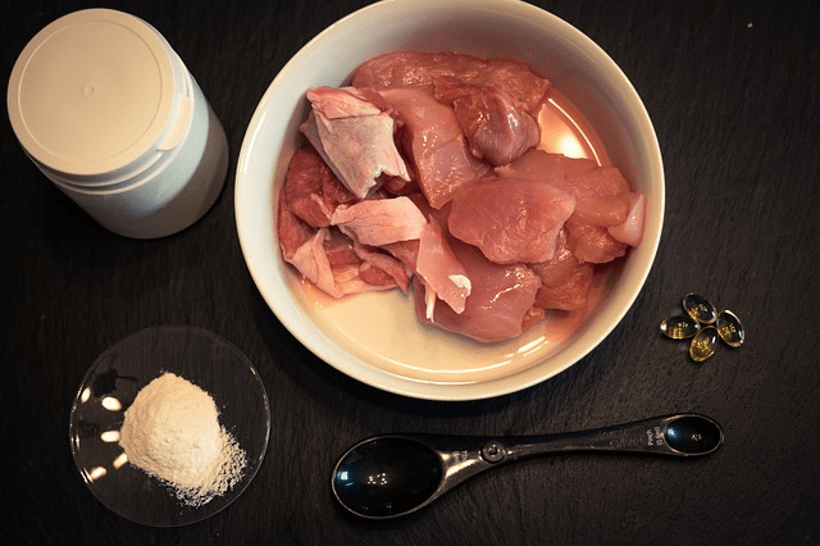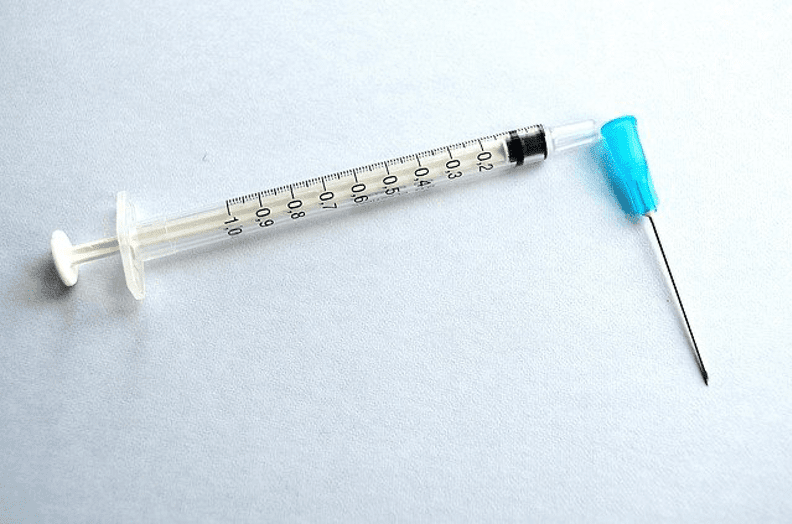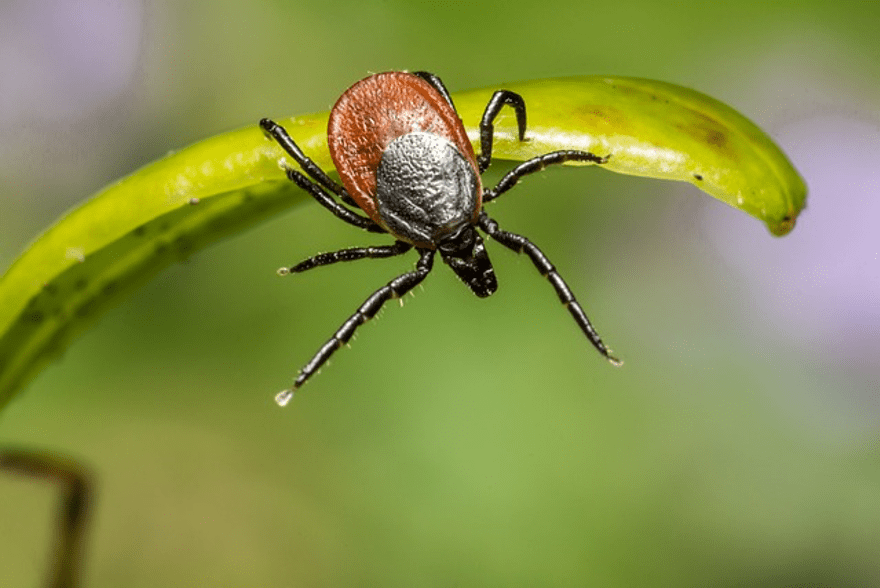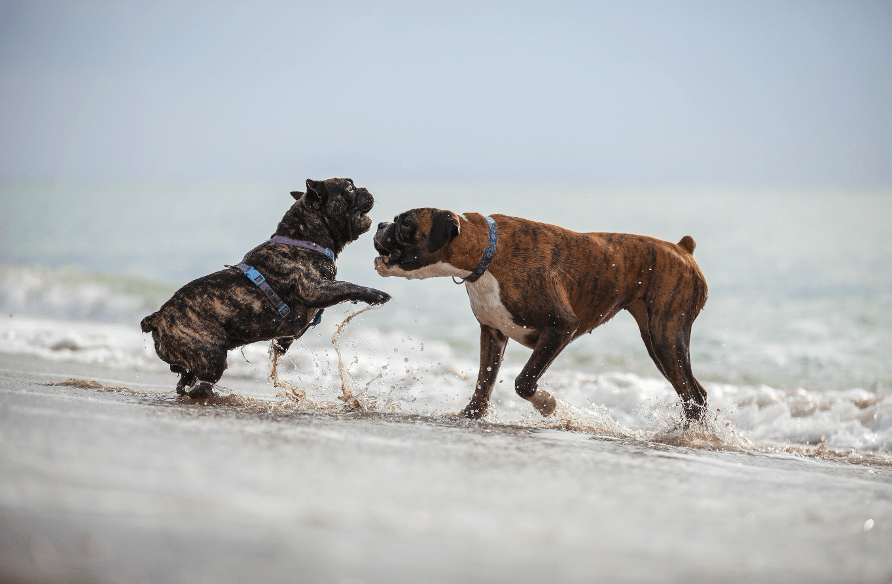French Bulldog. The funny, loyal, loving, and “issue prone” dog that is loved by so many around the globe.
French Bulldogs originated from France about 150 years ago, but only really started gaining momentum in the last 5-7 years.
Every pure bred dog comes with its set of issues, due to breeding for certain traits that don’t always promote health. Even though some French Bulldog issues can’t be eliminated, there are still a few approaches that will in our opinion add to the quality of life of your bully.
Here are some common mistakes bulldog owners, and dog owners in general make. We challenge you to read books and educate yourself on the topics below, and make a change if the new knowledge steers you into that direction.

1. Improper Diet
There is only one diet that is biologically appropriate for your dog and it’s not kibble nor is it cooked food, even though cooked food is a better alternative to kibble for sure.
It’s the raw diet. Raw meat, raw bones, organs, eggs, veggies. It’s the only diet that will give your dog a great start at life, prevent skeletal disease French bulldogs are “so prone to” (read hip dysplasia, patellar luxation, etc..), and reduce your vet visit frequency.
The **BARF diet **is very simple and when you learn more about it, a logical approach to feeding your dog. Have you ever seen a wolf hunt down an animal, collect the meat, then bake it on a high temp to turn it into kibble? No.
The commercial dog food gained momentum in 1950, which conveniently correlates with the increase of dog cancer, skeletal disease, bladder stones, arthritis, and an increase of allergies in dogs. Before that dogs ate raw meat, raw bones, and other table scraps. We forced our dogs to adapt to a diet that they weren’t meant to consume, for our own convenience and its affecting them on a daily basis.
It’s never too late to reverse some of the damage that was done by feeding your Frenchie improperly. Owners report elimination of allergies, ear infections, arthritis and other modern day dog problems we often hear about - after switching to species appropriate diet.

2. Over-Vaccination
_What vaccines does my French Bulldog need? _The answer is less is more.
We recommend giving your puppy the core DHPP vaccine at 12 weeks and another booster at 16 weeks. That vaccine will protect your dog for at least 5-6 years, or in some cases lifetime.
If you are unsure about the level of immunity your dog has towards infectious diseases you can request a blood titer. Your veterinarian will draw blood and check the number of antibodies still present. If the amount is low then you should consider re-vaccinating, but that is rarely the case.
** Rabies shot?** Of course. Rabies vaccination is required by law. There is also no cure for rabies, so if your dog gets infected there isn’t much you can do. And let’s not forget rabies is zoonotic, meaning it can transfer to humans. Again, a blood titer test can be required to check the level of immunity.
** _What about Bordatella, Lyme, Leptospirosis? _**Those are called lifestyle vaccines. They need to be injected yearly and unfortunately often don’t offer 100% protection. If you don’t live in a geographical area that is very prevalent in leptospirosis or tick born disease, then vaccination for those can be avoided.
_**Bordatella? **_Bordatella vaccine protects your dog from kennel cough and it’s recommended if your dog lives in a kennel where the cough could potentially spread rapidly between a big number of dogs and puppies. If your dog is a family pet and doesn’t visit boarding facilities too often, then this vaccine should in my opinion be avoided. But the choice is yours.
Read More About The Non-Core Vaccines By Clicking Here.
If you are taking great care of your dog, feeding it properly, and avoiding over-vaccination you will be a proud owner of a Frenchie with an extremely healthy immune system, so chances of your dog ACTUALLY catching a virus will be very slim.
On the other hand, every vaccination lowers your dogs immune system to a sometimes irreparable degree, putting it at risk for allergies, cancers, neurological issues, etc.
The post is written by a Doctor of Veterinary Medicine that has 20+ years of experience in the field.

3. Early Spay/Neuter
Suggesting an early spa is a very standard practice in today’s veterinary medicine, but early spaying/neutering is a very gray area, with some clinics trying to schedule the procedure as soon as possible vs. informing you it’s important to wait.
We do understand the problem with pet overpopulation, which is why early spay is highly suggested nowadays. However, there are some downsides to an early spay that owners often aren’t informed about.
Pros and Cons of Neutering Your Male Dog
Pros and Cons of Spaying Your Female Dog
_What is the downside of an early spay? _There are so many downsides of an early spay that the owners aren’t informed about when committing to the procedure.
I feel like every pet owner should be presented with all pros and cons and make a decision based on facts.
**By spaying/neutering your French Bulldog early you are potentially putting it at risk for **
- Life long low immunity (dogs immune system doesn’t fully develop until the age of 2-3. There are certain reproductive hormones needed to achieve that),
- Skeletal problems that are very common in the breed like hip dysplasia, patellar luxation, IVDD and more..
- Bone cancer
- Obesity
- Thyroid problems
Read More About Potential Risks By Clicking Here
_So when should you ideally spay/neuter in our opinion? _We suggest waiting until your French Bulldog female is at least 15 months old, and your male is 2 years of age.

4. Tick/Flea/Heartworm Prevention
Simparica, Bravecto, Nextguard, Heartguard.. I’m sure you are very familiar with the names and chances are your Frenchie is on at least one if not multiple of these preventative treatments.
Let’s look at how these anti-parasitic treatments work. Each of the above-mentioned treatments contains small dosages of neurotoxins that paralyze and eventually kill the parasite. The poison is fed to your dog and builds up in their skin. Once the flea or tick tries to attach to your dog it instantly kills it.
All these brands claim that the amount of poison released is so small it’s completely safe for your dog. But is it?
There was not a single study done about the side effects of giving your dogs small amounts of poison these products contain for several years.
We challenge you to do research and join Facebook groups/talk to other pet owners, before giving any of the preventative treatments to your dog. The products were put under the microscope multiple times after owners reported seizures, severe allergic reactions and even death of their beloved pet.
We don’t use it for our dogs and would not take the risk due to all the adverse side effects reported over the years, but the decision is yours.
Here are some products that we personally use on our adult dogs as well as our little puppies. They are organic and for us, they work like a charm.
Wondercide Natural Products - Flea, Tick and Mosquito Control Spray
EcoFlea by ColoradoDog - all Natural Chewable Dog Treats for Flea and Tick Treatment and Prevention
Vet’s Best Flea and Tick Home Spray
_What about Heartworm Prevention Medicine? _
There is so much to say about heartworm medicine prevention and mostly about how unnecessary it is to give it year round. It all makes complete sense once you learn about the heartworm larvae life cycle.
Click here to learn why Heartworm prevention shouldn’t be given year round.

5. Improper Exercise Of a Young Puppy
A young puppy is a puppy that is still growing. Their bones are soft and not fully developed, joints not fully formed.
The most common mistake we see owners do is:
- _Drag their puppy when it’s refusing to walk on the leash. _
I get it, it can be frustrating, but by doing that you are severely damaging those growing bones and setting your dog up for skeletal problems later on.
- Have their puppy perform tricks on their hind legs
There is no reason a growing puppy should be putting extra weight on its back legs until the bones are done growing.
French Bulldogs or any dogs for that matter should only be involved in puppy play and very short walks until their bones are done growing.
The process is usually over by the time they reach sexual maturity. There are certain hormones that play a big role in bone growth, so going back to number 3, spaying them early, and removing those essential hormones sets them up for skeletal disease later on.
Will You Make The Changes?
If you made it this far congratulations. You will now be able to implement some of our tips and transform your approach when it comes to dog care. The results will be a healthy, happy doggo, fewer vet visits, and longer life expectancy. Now it’s your turn. Will you make the changes?



